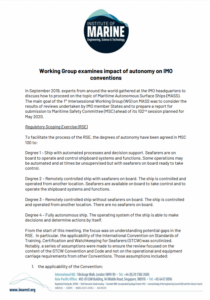In September 2019, shipping experts from around the world gathered at the IMO headquarters to discuss how to proceed on the topic of Maritime Autonomous Surface Ships (MASS), at the first Intersessional Working Group (WG) on MASS, IMarEST informed.
The main goal of the meeting was to consider the results of reviews undertaken by IMO member States and to prepare a report for submission to Maritime Safety Committee (MSC) ahead of its 102nd session planned for May 2020.
The intersessional MASS WG focused on understanding potential gaps in the Regulatory Scoping Exercise (RSE) and concentrated its work to the following list of Conventions:
–>STCW
The review found:
- The STCW Convention only applies as long as seafarers are onboard.
- The STCW Convention must be amended to reflect the changing skills requirement as a result of technological progress.
- The STCW Convention would still apply to security functions.
- The ‘remote operator’ training definition will be deferred to future sessions.
The regulations relevant to MASS may need to be revisited if remote control operators are recognized as seafarers and thus subject to the Convention,
…IMarEST noted.
–> STCW-F 1995
A separate version of STCW for personnel on fishing vessels >24m in length is currently undergoing comprehensive review, which is expected to bring it more in line with the structure of STCW 1978 and the STCW Code.
Therefore, it is recommended that the RSE for the STCW 1978 and STCW Code to be given immediate priority.
–> SOLAS Chapter VII – IMDG Code – IBC Code
Discussions pertaining to ships carrying dangerous chemicals in bulk revolved around clarifying roles onboard including the definition of the role of Master and crew; certain manual operations and tasks; and emergency response.
It was concluded autonomous vessels would have to adopt appropriate alternative safety measures so as to achieve the functionalities intended by the existing regulations.
Future work will look to develop an understanding of the level of risk owing to absence of persons onboard.
At this stage it is understood that seafarers onboard will take control at autonomy levels 1 or 2 but it remains unclear what their role will entail.
–> SOLAS Chapter III on Life Saving Appliances (LSA)
As regulations stand, seafarers will still be required onboard for the foreseeable future in accordance with SOLAS regulation III/10.
The purpose is to assist and/or evacuate passengers in an emergency situation. Technology and appropriate safety cases must be developed to fill this gap before autonomy levels 3 and 4 are realised.
Greater clarity is also needed on the roles and responsibilities of MASS during man overboard situations and further investigation is necessary for personnel boarding a vessel in port where they could be provided with LSA.
As a result, training of personnel onboard to deal with emergency situations will still be required.
–> SOLAS Chapter II-1 on construction – 1/2/1
At autonomy level 3 and 4, the impact on personnel other than seafarers on board such as specialists or maintenance personal will be reviewed. This may call for a new code rather than a chapter amendment.
–> SOLAS Chapter V on safety of navigation – 1/2/16
The question of excluding passenger vessels from autonomy levels 3 and 4 will be addressed during phase 2 of RSE.
Whilst a new mandatory Code for autonomy levels 3 and 4 may have to be developed alongside ISM, discussion suggests that SOLAS Chapter IX on the management for the safe operation of ships and the ISM may be the key instrument in MASS moving forward.
–> SOLAS Chapter XI-1 on special measures to enhance maritime safety and associated codes.
The outcome was that certificates and manuals onboard require further clarification under autonomy 3 and 4. This is to include functions, rights and responsibilities as required by remote operating centres, including personnel. While the WG was tasked to consider if the issue of onboard certificates is already solved by the e-certificate policy, the rights and responsibilities of remote operating centres are part of a broader discussion relating to the overriding issue of the definition of Master on degrees of autonomy 2, 3 and 4
–> Annex of SOLAS Chapter XII on additional safety measures for bulk carriers
There are some provisions which require actions by personnel onboard. Examples include Page 4 of 5 onboard maintenance, and provisions on alarms and accessibility. Appropriate alternative safety measures should be adopted to achieve the equivalent functionalities intended by the existing regulations.
–> SOLAS Chapter XIV on safety measures for ships operating in polar waters and the Polar Code.
Functions, rights and responsibilities of remote operating centres is part of the broader discussion which also relates to the overriding issue of the definition of Master on degrees of autonomy 2, 3 and 4.
–> COLREG
The role of the Master in relation to rule 2 (Responsibility) requires clarification particularly when in control of a vessel with no Master onboard. Lights, shapes and sound signals will also have to be revisited going forward.
The WG has been also tasked to develop a guidance for the second phase. The results of the second phase are expected to provide suggestions on how to progress the work after MSC 102, especially on the priorities of future actions.
At the moment, the MASS Special Interest Group (SIG) is considering the future of Education and Training as well as the UN Sustainable Development Goals (SDGs), the technological progression and the ethical use of technology for the betterment of human beings.
This also includes recommendations on the training requirements for the future ‘remote operator’.
The MASS SIG will more closely engage with representatives from member States to further investigate which competency requirements should and could be removed from the STCW and STCW-F as well as to encourage the standardization of remote and autonomous vessel operations.
Explore more herebelow:
































































